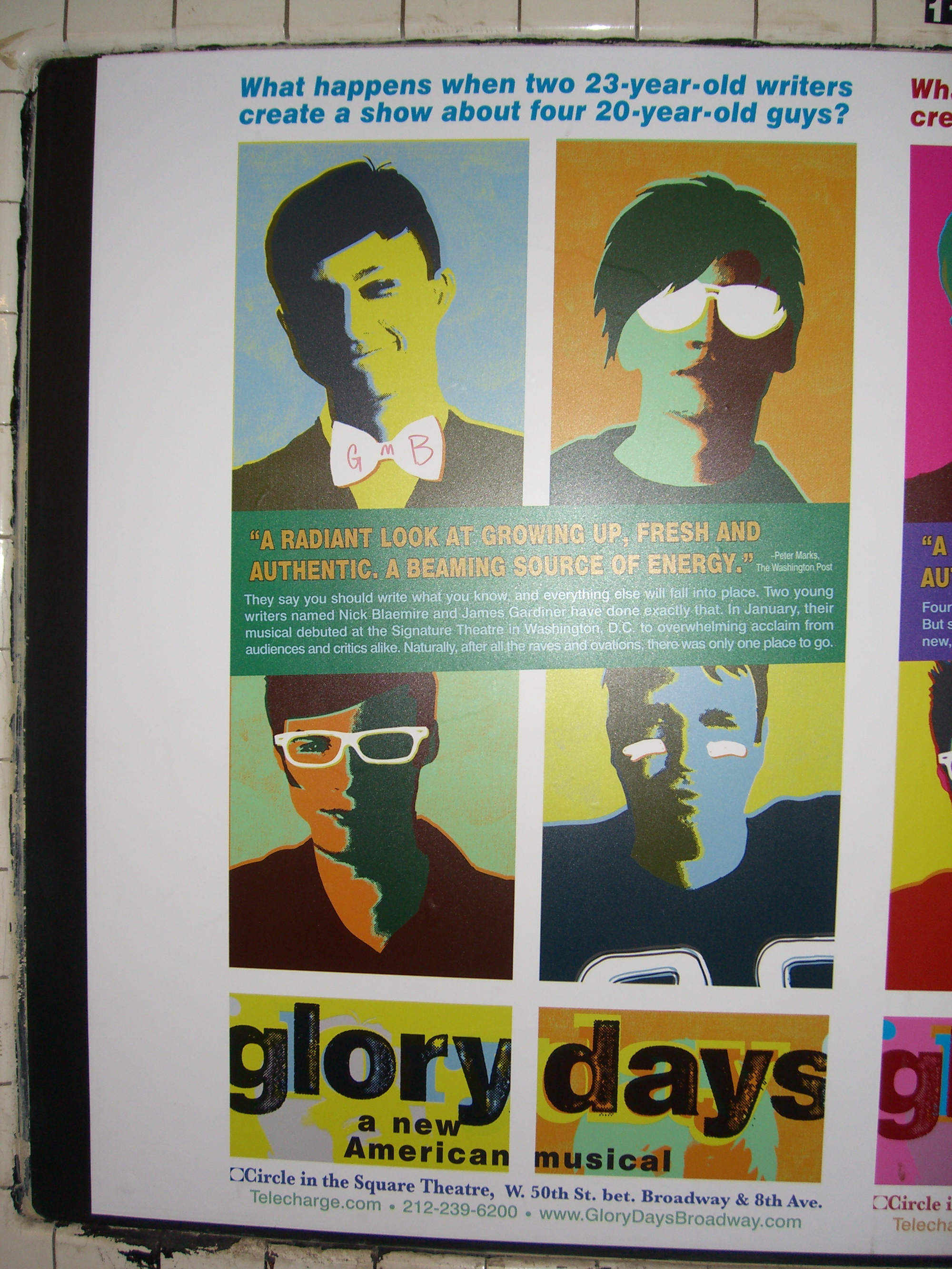 Since you are no doubt eagerly awaiting news of your favorite ex-Broadway show, the NYT has done a post-mortem on Glory Days (obligatory joke: “Don’t you mean… Glory Day? Ha!”). From the article:
Since you are no doubt eagerly awaiting news of your favorite ex-Broadway show, the NYT has done a post-mortem on Glory Days (obligatory joke: “Don’t you mean… Glory Day? Ha!”). From the article:
But neither Mr. Blaemire nor Mr. Gardiner [the show’s barely-legal writing team] seems to be rattled; both said they were not nearly as upset about the whole experience as their mothers were. They are, in fact, working on their next show.
“If you look at it from the outside, these guys were in a fast situation, moved a show that wasn’t ready, it flopped and they’re a failure; I could see how you would think that would not be worth anyone’s time,” Mr. Blaemire said. “But from our perspective, we got a chance to learn everything about what it takes to put on a Broadway show.”
Oh good. Our protagonists have learned to wipe Mom’s tears and stoically get back on the bike. Cheesy enough to be the plot of a Broadway flop.
I’m being snotty (duh, it’s teh inturwebz), and of course I would probably give several toes for the opportunity to have even a failure with that high a showbiz profile. Actually, as I read it, the article lays most of the blame on a producing team who pushed the show too far too fast (or just too far) rather than on the writers, who come off sympathetic,
First reaction: If the show hadn’t had the single worst poster in the history of the world, that might have helped. (See earlier post.)
Second reaction: I feel like there’s a double-standard going on. If the show was a massive hit, the New York Times would be writing something about these bold young geniuses. But it turned out to suck… and the story is the producers led these talented young kids astray.
I’m not so quick to let these young whippersnappers off the hook. Mr. Blaemire and Mr. Gardiner wrote every word and every note of that show – they deserve the credit for its shortcomings, just as I’m sure they’d get all the credit for its success. At the end of the day, the best thing they can say in their defense is “our producers should have let us know it was lame,” which is a lame thing to say.
Wait a minute — I think a live show can be very good in its way and still not be meant for Broadway. Rialto tuners are very specific things.
(that was Variety speak by the way)
But Matt, aren’t you forgetting about the almost-universally bad reviews? This wasn’t a show that was “very good in its way” but wrong for the market. This was a bad show.
The NEW YORK reviews were universally bad. They loved it in DC, where it was a huge success and everyone was overjoyed with the plucky little geniuses who had created it. (This — and probably visions of the success of Spring Awakening — is what made the producers want to transfer to Broadway in the first place.)
Hey, let’s have a flame war. It may well drive up readership.
Actually, I think I’ll back off of bashing poor James and Nick. The Washington Post did indeed rave about the show. And although the New York Times didn’t like it, Ben Brantley does say:
“I do find it heartening that a pair of enthusiastic and gifted young artists have fallen in love with that beleaguered form, the musical, as a means of self-expression.”
They’re “gifted,” according to freaking Ben Brantley. And since I wasn’t among the 14 people to actually see Glory Days, I’ll defer to him.
However: John O’Boyle and Ricky Stevens, you are the worst producers ever.
I was thinking something more along the lines of “fuck off you dick.” But your more measured response is for the best…
I’m late to a party, but it’s not a double standard. They’re just judging the value of a show based on its commercial success. That’s bullshit, douchebaggy, and artisticall and intellectually empty, but it’s not hypocritical.
Well, it’s probably hypocritical for a newspaper to criticize somebody else’s profitability, but that’s a separate matter.
I think the real story here is that mainstream commercial theater is _starving_ for shows, but its mechanisms and business model have pretty much no good way of getting them on stage other than blind luck.
I’d just like to point out that In the Heights, which won a slew of Tonys yesterday, was first performed at Wesleyan University. But when it moved to Broadway, they didn’t advertise it like, “Can you believe these kids wrote a whole show all by themselves???”